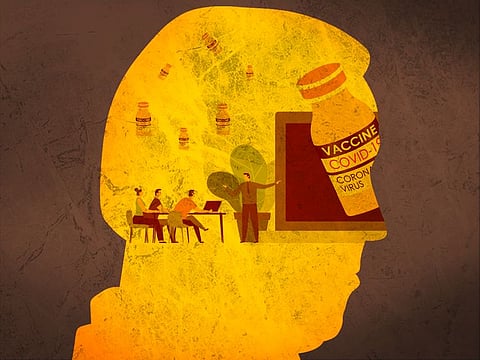Biden stands for competency, science and service beyond self
New US president is a statesman with an inner fortitude informed by fragility in his life

America is fragile. Our power rests in the ability to pick ourselves up.
Fragile is not a word we normally associate with America.
But fragile is where we are as we wake up as Joe Biden takes over the next president of the US.
Fragile like a trigger: insurrection fuelled by anger and delusion. A pandemic spreading out of control.
Donald Trump, who ignored the call to duty, is now headed to his new home. He leaves in his trail a terrifying reminder that when power itself becomes the goal it ceases to function as a means for governance.
Now he is replaced by a statesman, who has developed a kind of inner fortitude from publicly navigating the fragility in his own life. He brings that experience onstage this morning — the humility that accompanies uncertainty, the empathy born of loss, the special balance one gains after stumbling in his own life and finding the resilience to stagger forward.
A man who wanted the world to see him as a strongman is replaced by a man who will model a contrasting definition of strength that comes with age, experience, hard knocks and soft notes. Biden is a president with the soul of a cleric, a heart-wide-open leader who likes being called Grandpa Joe.
That, to my mind, is a great thing for a country both in mourning and on edge. The heart, after all, is the hardest-working muscle. It beats for a lifetime, even when broken, at a rhythm that propels us onward.
Urgency of fixing the economy
Americans will be looking for the punctuation they need in this transfer of power. Certainly not a comma or a colon or even a period. This inauguration calls for an exclamation point that heralds a fresh chapter even as we drag quite a mess into the new era.
An exclamation that speaks to the urgency of fixing the economy, governing with a passion and a purpose, and combating the twin viruses of the pandemic and racism. An exclamation that comes when we decide to stop pretending and start facing our problems head-on.
Inaugurations are usually terra firma moments. Members of both parties traditionally stand together on that grand stage. That normally feels like steady ground.
But we’ve all just experienced a year-long earthquake that has fractured our foundation.
We need to acknowledge that our foundation was not as strong as we believed. What passed for normal before our current convulsions provided comfort to some but cruel inequities for those striving on the margins. The insurrectionists who rebelled in the service of the Big Lie shook us to the core, but the sins of omission over decades have kept America’s cultural infrastructures from achieving the unassailable sturdiness we really need.
Fully confronted America's birth defects
We’ve never fully confronted our nation’s birth defects — Slavery. Night riders. White hoods. Jim Crow. Poverty that becomes acceptable.
We have never fully interrogated the embedded bias that America belonged to some more than others, that citizenship came with a scale ranging from, “We built this land” to, “You’re just lucky we let you in.”
A man who won a closely contested election takes the stage with the chance to remedy these foundational defects. Or make a start. The task of repairing these fractures will take decades.
Remember, too, that another winner also took that stage, one who has punched through multiple ceilings to make history. Vice President-elect Kamala D. Harris, Black and South Asian, married to a Jewish man, stepmother to two children, a graduate of Howard University, will take the oath administered by Sonia Sotomayor, the first Latina to serve on the Supreme Court.
Biden recently said, “We will, once again, lead not just by the example of our power, but by the power of our example.”
That statement is a reminder of the potholed road ahead. That word — power — has special currency that goes well beyond the traditional definition. It is usually synonymous with stature, strength, strut and might.
Power in our nation, in our presidency, in our divided sense of what it means to be American, will rest in our ability to pick ourselves up, examine our wounds and figure out how to move forward with confident and measured steps.
Today is all about promise. Every pledge is wispy until it is made real. Even the most certain of assertions floats on simple air until it finds committed hands and collective effort.
So yes, the United States is in a fragile state at present. Let’s admit that and then steady ourselves for a new brand of leadership based on competency, science and service beyond self.
Michele L. Norris is a noted columnist and founding director of The Race Card Project
Washington Post






